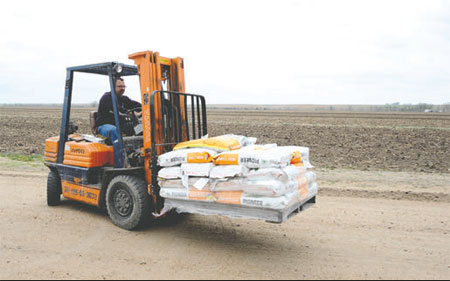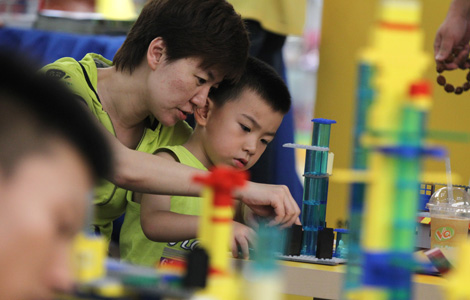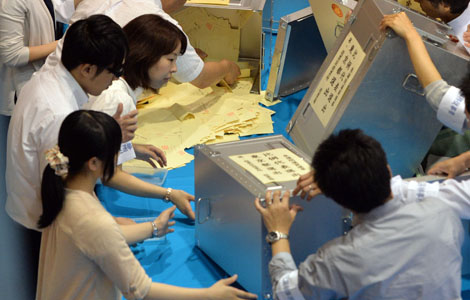China is tackling food problems: expert
Updated: 2013-07-22 11:18
By Michael Barris in New York (China Daily)
|
||||||||
|
Lance Russell transports bags of DuPont Co's drought-tolerant "Pioneer" corn seeds in preparation for planting, on his farm near Hays, Kansas. The American hybrid seed maker wants to work closely with China to improve the quality, efficiency and productivity of agriculture in the most populous country in the world. Larry W. Smith / Bloomberg |
China is learning how to feed the world's most populous country, but it still needs stronger regulations to govern research and development, crop registration, seed-quality standards and selling practices, according to an executive of the largest US producer of hybrid seeds for agriculture.
"Building those kinds of regulatory structures cooperatively with the government, which we've been doing, is an exercise that ultimately builds trust and mutual respect," said Daniel Jacobi, vice-president for DuPont Pioneer's Asia Pacific region.
DuPont, the Delaware-based chemical maker formally known as EI du Pont de Nemours and Co, and China both "want regulatory structures that are science-based, that are transparent, that are evenly and consistently applied", he said in an interview with China Daily.
China's success in feeding a fifth of the world's population despite a farmland shortage "is a testament to the ingenuity of Chinese farmers", he said. Statistics show that China has 19 percent of the world's population, but only 7 percent of its farmland, or just 0.23 acres of farmland per person. By comparison, the United States has 3 acres of farmland per person.
"The government is pursuing a diverse range of reforms," Jacobi said. "Chinese farmers are adopting high-quality corn and rice hybrids, they are mechanizing their operations, using single seed planters, learning how to use inputs to maximize their productivity."
The changes come from China's five-year plan, which has identified food security, food safety, productivity and waste reduction as challenges to overcome for China to achieve its goal of 95 percent self-sufficiency in basic foodstuffs by 2020, Jacobi said.
The government is revamping comprehensive food safety legislation first passed in 2009. The revised plan calls for 14 different government departments, including the Ministry of Health, the Ministry of Science and Technology and the Ministry of Agriculture, to work together to modernize standards by 2015. The reforms come in the wake of a tainted-milk scare, the discovery of dead pigs in Shanghai's rivers and other problems that focused renewed attention on food safety.
China has tackled food security and child nutrition by working with non-governmental organizations (NGOs) such as the International Fund for Agriculture Development, the United Nations' Food and Agriculture Organization, and the World Bank, according to a white paper produced by Fortune Industry Perspectives and DuPont ahead of the 2013 Fortune Global Forum in June in Chengdu.
The country has more than 2,000 national food regulations and more than 2,900 industry-based regulations, according to the white paper.
In February 2012, DuPont signed a multi-year lease agreement with Beijing International Flower Port to build a state-of-the-art technology hub for its Pioneer seed business in Beijing. The hub uses Pioneer's molecular breeding expertise to develop new high-yielding maize hybrids that improve the sustainability of farming in China, while enhancing food security.
"This is a further extension of how DuPont is investing in global science to identify solutions locally," said Bill Niebur, DuPont vice-president and Pioneer China general manager, in a news release.
Zhao Fei, vice-manager of Beijing Flower Port Investment Development Center, said the project would "provide strong support for construction of a high-end agricultural brand and seed industry in Shunyi district, which will boost the construction of the Beijing National Modern Agricultural Science and Technology City."
Although China is "a unique challenge", Jacobi said, DuPont Pioneer can help ease its food problems by employing an approach that has already been used successfully around the world. "Just simplifying getting the right genetics on a particular farm can increase productivity by a third," he said.
The company's approach emphasizes improved genetics (helping crops adapt to local conditions), high quality seed (assuring the farmer that every planted seed will germinate) and crop-management support (to maximize productivity and profitability), Jacobi said.
"Nobody has all the answers. No company, no individual, no government, no university," Jacobi said. "So you've got to work together to develop those solutions. And agriculture is an area where you take global science and adapt it to local conditions. But you can only do that through collaboration. If you fail to do that, global science without local application doesn't really mean much."
michaelbarris@chinadailyusa.com
(China Daily USA 07/22/2013 page2)
Most Viewed
Editor's Picks

|

|

|

|

|

|
Today's Top News
Woman jailed in Dubai after reporting rape
Guangdong to probe airport bomber's allegations
Police meets GSK representative after scandal
US protests demand 'justice for Trayvon'
6.6-magnitude quake hits NW China
Minister rules out stimulus package
Top Chinese admiral to visit US this year
Victory improves Abe's hand
US Weekly

|

|















